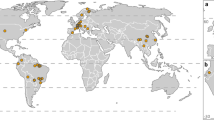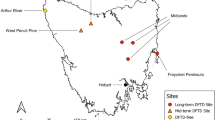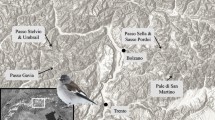Abstract
Climate change alters multiple physical drivers that act concurrently on ecological communities. Evidence suggests widespread non-additive effects between multiple drivers; most of this evidence, however, is based on species-level responses, which is problematic because community responses to environmental change also depend on species interactions. To address this knowledge gap, this study experimentally manipulated two physical drivers and examined the responses of a predator–prey interaction. The two drivers tested are fundamental in intertidal systems: air and water temperatures. The two species were the intertidal dogwhelk, Nucella ostrina, and its barnacle prey, Balanus glandula. The objective was to test alternative hypotheses that air and water warming have additive vs. non-additive effects on the whelk-barnacle interaction. A 14-day mesocosm experiment was conducted in which animals were subjected to one of four temperature treatments: ambient (no temperature manipulation; water 12 °C, air 13 °C), warm water (15 °C), warm air (27 °C), or combined (water 15 °C, air 27 °C). There were two key findings. First, air and water warming non-additively affected interaction strength: warm water mitigated a 35% decrease in mean whelk feeding rate caused by warm air. Second, air warming had contrasting effects on individual growth rates of predator and prey. While whelk growth decreased by ~ 60% in warm air, barnacle growth increased by 47%. These findings suggest that combined air and water warming will benefit barnacle populations more than their whelk predators. This study highlights the value of integrating species performances and interactions to understand how multiple physical drivers may affect community structure.




Similar content being viewed by others
References
Barnes M (2000) The use of intertidal barnacle shells. In: Oceanography and marine biology an annual review. pp 157–187
Barnes H, Finlayson DM, Piatigorsky J (1963) The effect of desiccation and anaerobic conditions on the behaviour, survival and general metabolism of three common cirripedes. J Anim Ecol 32:233. https://doi.org/10.2307/2537
Bates D, Mächler M, Bolker B, Walker S (2015) Fitting linear mixed-effects models using lme4. J Stat Softw. https://doi.org/10.18637/jss.v067.i01
Bell EC (1995) Environmental and morphological influences on thallus temperature and desiccation of the intertidal alga Mastocarpus papillatus Kützing. J Exp Mar Biol Ecol 191:29–55. https://doi.org/10.1016/0022-0981(95)00037-R
Berlow EL, Navarrete SA (1997) Spatial and temporal variation in rocky intertidal community organization: lessons from repeating field experiments. J Exp Mar Biol Ecol 214:195–229. https://doi.org/10.1016/S0022-0981(97)00023-3
Bertness MD, Schneider DE (1976) temperature relations of puget sound thaids in reference to their intertidal distribution. Veliger 19:47–58
Brown JH, Gillooly JF, Allen AP, Savage VM, West GB (2004) Toward a metabolic theory of ecology. Ecology 85:1771–1789. https://doi.org/10.1890/03-9000
Cheng BS, Komoroske LM, Grosholz ED (2017) Trophic sensitivity of invasive predator and native prey interactions: integrating environmental context and climate change. Funct Ecol 31:642–652. https://doi.org/10.1111/1365-2435.12759
Cole WH (1929) The relation between temperature and the pedal rhythm of Balanus. J Gen Physiol 12:599
Connell JH (1970) A predator-prey system in the marine intertidal region. I. Balanus glandula and several predatory species of Thais. Ecol Monogr 40:49–78. https://doi.org/10.2307/1942441
Crain CM, Kroeker K, Halpern BS (2008) Interactive and cumulative effects of multiple human stressors in marine systems. Ecol Lett 11:1304–1315. https://doi.org/10.1111/j.1461-0248.2008.01253.x
Darling ES, Côté IM (2008) Quantifying the evidence for ecological synergies. Ecol Lett 11:1278–1286. https://doi.org/10.1111/j.1461-0248.2008.01243.x
Dayton PK (1971) Competition, disturbance, and community organization: the provision and subsequent utilization of space in a rocky intertidal community. Ecol Monogr 41:351–389. https://doi.org/10.2307/1948498
Dell AI, Pawar S, Savage VM (2011) Systematic variation in the temperature dependence of physiological and ecological traits. Proc Natl Acad Sci 108:10591–10596. https://doi.org/10.1073/pnas.1015178108
Dethier MN, Williams SL (2009) Seasonal stresses shift optimal intertidal algal habitats. Mar Biol 156:555–567. https://doi.org/10.1007/s00227-008-1107-8
Dillon ME, Woods HA, Wang G, Fey SB, Vasseur DA, Telemeco RS, Marshall K, Pincebourde S (2016) Life in the frequency domain: the biological impacts of changes in climate variability at multiple time scales. Integr Comp Biol 56:14–30. https://doi.org/10.1093/icb/icw024
Dowd WW, King FA, Denny MW (2015) Thermal variation, thermal extremes and the physiological performance of individuals. J Exp Biol 218:1956–1967. https://doi.org/10.1242/jeb.114926
Fakhoury WA, Gosnell JS (2014) Limits to local adaptation: some impacts of temperature on Nucella emarginata differ among populations, while others do not. Mar Biol 161:1943–1948. https://doi.org/10.1007/s00227-014-2459-x
Faraway JJ (2006) Extending the linear model with R: generalized linear, mixed effects and nonparametric regression models. Chapman & Hall/CRC, London
Folt CL, Chen CY, Moore MV, Burnaford J (1999) Synergism and antagonism among multiple stressors. Limnol Oceanogr 44:864–877. https://doi.org/10.4319/lo.1999.44.3_part_2.0864
Foster BA (1971) Desiccation as a factor in the intertidal zonation of barnacles. Mar Biol 8:12–29
Gillooly JF, Brown JH, West GB, Savage VM, Charnov EL (2001) Effects of size and temperature on metabolic rate. Science 293:2248–2251. https://doi.org/10.1126/science.1061967
Gilman SE, Urban MC, Tewksbury J, Gilchrist GW, Holt RD (2010) A framework for community interactions under climate change. Trends Ecol Evol 25:325–331. https://doi.org/10.1016/j.tree.2010.03.002
Gilman S, Hayford H, Craig C, Carrington E (2015) Body temperatures of an intertidal barnacle and two whelk predators in relation to shore height, solar aspect, and microhabitat. Mar Ecol Prog Ser 536:77–88. https://doi.org/10.3354/meps11418
Gunderson AR, Armstrong EJ, Stillman JH (2016) Multiple stressors in a changing world: the need for an improved perspective on physiological responses to the dynamic marine environment. Annu Rev Mar Sci 8:357–378. https://doi.org/10.1146/annurev-marine-122414-033953
Halpern BS, Selkoe KA, Micheli F, Kappel CV (2007) Evaluating and ranking the vulnerability of global marine ecosystems to anthropogenic threats. Conserv Biol 21:1301–1315. https://doi.org/10.1111/j.1523-1739.2007.00752.x
Harley CDG (2013) Linking ecomechanics and ecophysiology to interspecific interactions and community dynamics: linking ecomechanics to community ecology. Ann N Y Acad Sci. https://doi.org/10.1111/nyas.12228
Harley CDG, Randall Hughes A, Hultgren KM, Miner BG, Sorte CJB, Thornber CS, Rodriguez LF, Tomanek L, Williams SL (2006) The impacts of climate change in coastal marine systems. Ecol Lett 9:228–241. https://doi.org/10.1111/j.1461-0248.2005.00871.x
Harlow HJ, Hillman SS, Hoffman M (1976) The effect of temperature on digestive efficiency in the herbivorous lizard, Dipsosaurus dorsalis. J Comp Physiol B 111:1–6. https://doi.org/10.1007/BF00691105
Hayford H, Gilman S, Carrington E (2015) Foraging behavior minimizes heat exposure in a complex thermal landscape. Mar Ecol Prog Ser 518:165–175. https://doi.org/10.3354/meps11053
Helmuth BST (1998) Intertidal mussel microclimates: predicting the body temperature of a sessile invertebrate. Ecol Monogr 68:51–74
Helmuth B, Mieszkowska N, Moore P, Hawkins SJ (2006a) Living on the edge of two changing worlds: forecasting the responses of rocky intertidal ecosystems to climate change. Annu Rev Ecol Evol Syst 37:373–404
Helmuth B, Broitman BR, Blanchette CA, Gilman S, Halpin P, Harley CDG, O’Donnell MJ, Hofmann GE, Menge B, Strickland D (2006b) Mosaic patterns of thermal stress in the rocky intertidal zone: implications for climate change. Ecol Monogr 76:461–479. https://doi.org/10.1890/0012-9615(2006)076[0461:MPOTSI]2.0.CO;2
Huey RB, Stevenson RD (1979) Integrating thermal physiology and ecology of ectotherms: a discussion of approaches. Am Zool 19:357–366. https://doi.org/10.1093/icb/19.1.357
IPCC (2014) Climate change 2014: synthesis report. In: Core Writing Team, Pachauri RK, Meyer LA (eds) Contribution of working groups I, II and III to the fifth assessment report of the intergovernmental panel on climate change. IPCC, Geneva, p 151
King NG, Wilcockson DC, Webster R, Smale DA, Hoelters LS, Moore PJ (2017) Cumulative stress restricts niche filling potential of habitat-forming kelps in a future climate. Funct Ecol 00:1–12. https://doi.org/10.1111/1365-2435.12977
Kordas RL, Harley CDG, O’Connor MI (2011) Community ecology in a warming world: the influence of temperature on interspecific interactions in marine systems. J Exp Mar Biol Ecol 400:218–226. https://doi.org/10.1016/j.jembe.2011.02.029
Koussoroplis A-M, Pincebourde S, Wacker A (2017) Understanding and predicting physiological performance of organisms in fluctuating and multifactorial environments. Ecol Monogr 87:178–197. https://doi.org/10.1002/ecm.1247
Kuznetsova A, Brockhoff PB, Christensen RHB (2016) lmerTest: tests in linear mixed effects models. R package version 2.0-32. https://CRAN.R-project.org/package=lmerTest
Maestre FT, Callaway RM, Valladares F, Lortie CJ (2009) Refining the stress-gradient hypothesis for competition and facilitation in plant communities. J Ecol 97:199–205. https://doi.org/10.1111/j.1365-2745.2008.01476.x
Marshall DJ, McQuaid CD (2011) Warming reduces metabolic rate in marine snails: adaptation to fluctuating high temperatures challenges the metabolic theory of ecology. Proc R Soc B Biol Sci 278:281–288. https://doi.org/10.1098/rspb.2010.1414
McMahon RF (1988) Respiratory response to periodic emergence in intertidal molluscs. Am Zool 28:97–114
Menge BA, Olson AM, Dahlhoff EP (2002) Environmental stress, bottom-up effects, and community dynamics: integrating molecular-physiological and ecological approaches. Integr Comp Biol 42:892–908. https://doi.org/10.1093/icb/42.4.892
Miller LP (2013) The effect of water temperature on drilling and ingestion rates of the dogwhelk Nucella lapillus feeding on Mytilus edulis mussels in the laboratory. Mar Biol 160:1489–1496. https://doi.org/10.1007/s00227-013-2202-z
Miller LP, Harley CDG, Denny MW (2009) The role of temperature and desiccation stress in limiting the local-scale distribution of the owl limpet, Lottia gigantea. Funct Ecol 23:756–767. https://doi.org/10.1111/j.1365-2435.2009.01567.x
Nishizaki MT, Carrington E (2014) The effect of water temperature and flow on respiration in barnacles: patterns of mass transfer versus kinetic limitation. J Exp Biol 217:2101–2109. https://doi.org/10.1242/jeb.101030
Nishizaki MT, Carrington E (2015) The effect of water temperature and velocity on barnacle growth: quantifying the impact of multiple environmental stressors. J Therm Biol 54:37–46. https://doi.org/10.1016/j.jtherbio.2015.02.002
Paine RT, Tegner MJ, Johnson EA (1998) Compounded perturbations yield ecological surprises. Ecosystems 1:535–545. https://doi.org/10.1007/s100219900049
Palmer AR (1982) Growth in marine gastropods. A non-destructive technique for independently measuring shell and body weight. Malacologia 23:63–74
Pincebourde S, Sanford E, Helmuth B (2008) Body temperature during low tide alters the feeding performance of a top intertidal predator. Limnol Oceanogr 53:1562–1573
Pincebourde S, Sanford E, Casas J, Helmuth B (2012) Temporal coincidence of environmental stress events modulates predation rates. Ecol Lett 15:680–688. https://doi.org/10.1111/j.1461-0248.2012.01785.x
Porter WP, Gates DM (1969) Thermodynamic equilibria of animals with environment. Ecol Monogr 39:227–244. https://doi.org/10.2307/1948545
R Core Team (2016) R: a language and environment for statistical computing. R Foundation for Statistical Computing, Vienna. http://www.R-project.org/
Russell BD, Harley CDG, Wernberg T, Mieszkowska N, Widdicombe S, Hall-Spencer JM, Connell SD (2012) Predicting ecosystem shifts requires new approaches that integrate the effects of climate change across entire systems. Biol Lett 8:164–166. https://doi.org/10.1098/rsbl.2011.0779
Sala OE, Chapin FS, Iii Armesto JJ, Berlow E, Bloomfield J, Dirzo R, Huber-Sanwald E, Huenneke LF, Jackson RB, Kinzig A, Leemans R, Lodge DM, Mooney HA, Oesterheld M, Poff NL, Sykes MT, Walker BH, Walker M, Wall DH (2000) Global biodiversity scenarios for the year 2100. Science 287:1770–1774. https://doi.org/10.1126/science.287.5459.1770
Sanford E (1999) Regulation of keystone predation by small changes in ocean temperature. Science 283:2095–2096. https://doi.org/10.1126/science.283.5410.2095
Sanford E (2002a) The feeding, growth, and energetics of two rocky intertidal predators (Pisaster ochraceus and Nucella canaliculata) under water temperatures simulating episodic upwelling. J Exp Mar Biol Ecol 273:199–218. https://doi.org/10.1016/S0022-0981(02)00164-8
Sanford E (2002b) Water temperature, predation, and the neglected role of physiological rate effects in rocky intertidal communities. Integr Comp Biol 42:881–891
Schneider KR (2008) Heat stress in the intertidal: comparing survival and growth of an invasive and native mussel under a variety of thermal conditions. Biol Bull 215:253–264
Schneider CA, Rasband WS, Eliceiri KW (2012) NIH Image to ImageJ: 25 years of image analysis. Nat Methods 9:671–675. https://doi.org/10.1038/nmeth.2089
Seabra R, Wethey DS, Santos AM, Gomes F, Lima FP (2016) Equatorial range limits of an intertidal ectotherm are more linked to water than air temperature. Glob Change Biol 22:3320–3331. https://doi.org/10.1111/gcb.13321
Sokolova IM, Pörtner H-O (2003) Metabolic plasticity and critical temperatures for aerobic scope in a eurythermal marine invertebrate (Littorina saxatilis, Gastropoda: Littorinidae) from different latitudes. J Exp Biol 206:195–207. https://doi.org/10.1242/jeb.00054
Somero GN (2002) Thermal physiology and vertical zonation of intertidal animals: optima, limits, and costs of living. Integr Comp Biol 42:780–789. https://doi.org/10.1093/icb/42.4.780
Southward AJ (1955) On the behavior of barnacles I. The relation of cirral and other activities to temperature. J Mar Biol Assoc UK 34:403–422
Southward AJ (1957) On the behaviour of barnacles III. Further observations on the influence of temperature and age on cirral activity. J Mar Biol Assoc UK 36:323–334
Stickle WB, Carrington E, Hayford H (2017) Seasonal changes in the thermal regime and gastropod tolerance to temperature and desiccation stress in the rocky intertidal zone. J Exp Mar Biol Ecol 488:83–91. https://doi.org/10.1016/j.jembe.2016.12.006
Tomanek L, Helmuth B (2002) Physiological ecology of rocky intertidal organisms: a synergy of concepts. Integr Comp Biol 42:771–775
Tomanek L, Sanford E (2003) Heat-shock protein 70 (Hsp70) as a biochemical stress indicator: an experimental field test in two congeneric intertidal gastropods (Genus: Tegula). Biol Bull 205:276–284
Vaughn D, Turnross OR, Carrington E (2014) Sex-specific temperature dependence of foraging and growth of intertidal snails. Mar Biol 161:75–87. https://doi.org/10.1007/s00227-013-2316-3
Yamane L, Gilman S (2009) Opposite responses by an intertidal predator to increasing aquatic and aerial temperatures. Mar Ecol Prog Ser 393:27–36. https://doi.org/10.3354/meps08276
Acknowledgements
Emily Carrington and the FHL maintenance crew lent essential equipment. Comments from Jennifer Ruesink, Hilary Hayford, Lauren Buckley, Megan Dethier, Eliza Heery, Alexander Lowe, Ryan Kelly, and two reviewers improved this and an earlier version of this manuscript. Animal collectors, button pressers, and troubleshooters included Fred Ellis, Matt Schlinger, Tom Campbell, Molly Roberts, Dara Yiu, Lyda Harris, Katie Dobkowski, and Sasha Seroy. This work was supported by FHL (Richard and Megumi Strathmann Fellowship and Patricia L. Dudley Fellowship); the University of Washington Department of Biology (Biology-Friday Harbor Labs Award); and the Pacific Northwest Shell Club (Trevor Roberts Award).
Author information
Authors and Affiliations
Corresponding author
Ethics declarations
All applicable international, national, and/or institutional guidelines for the care and use of animals were followed. Animals were collected with permission of Friday Harbor Laboratories.
Conflict of interest
The authors declare no conflict of interest.
Additional information
Responsible Editor: F. Bulleri.
Reviewed by S. Pincebourde and an undisclosed expert.
Electronic supplementary material
Below is the link to the electronic supplementary material.
Rights and permissions
About this article
Cite this article
King, W., Sebens, K.P. Non-additive effects of air and water warming on an intertidal predator–prey interaction. Mar Biol 165, 64 (2018). https://doi.org/10.1007/s00227-018-3320-4
Received:
Accepted:
Published:
DOI: https://doi.org/10.1007/s00227-018-3320-4




